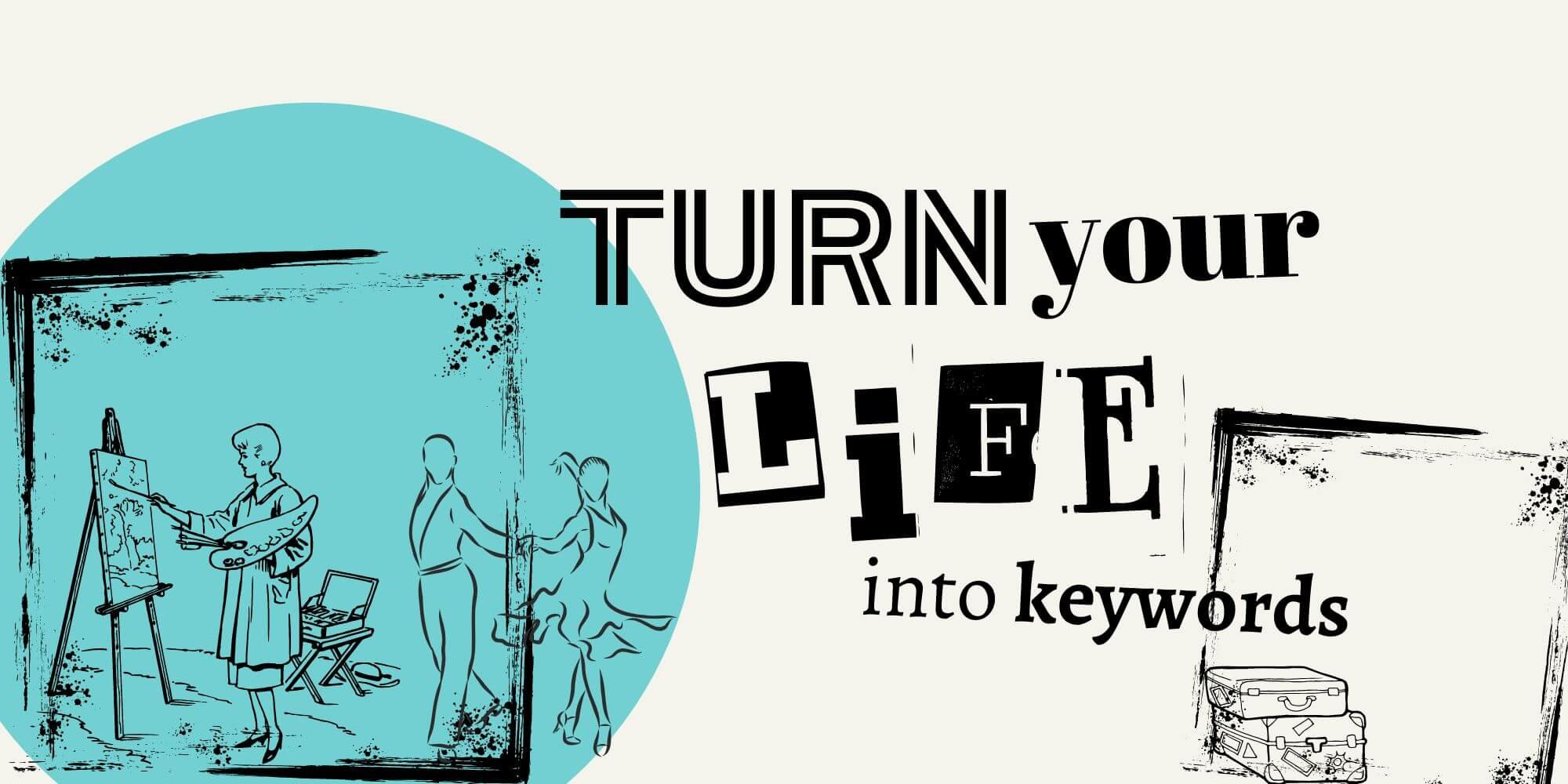How to Blog About Your Life (turn yourself into keywords)
I started this blog in 2022. Now it’s the main hub for my personal brand and something that brings me a lot of personal (and creative) pride.
At its core though, it’s just a blog about me. I write about the things I’m doing and the things I love. But it’s all intentional and brand-building.
Plus, it makes me money and unlocks exciting opportunities.
So, you may be wondering – can anyone do this? Definitely!
This is my guide on how to turn yourself into keywords and successfully blog about your life.
Alright, let’s get into it!
Table of Contents Show
This is part two of my six-part free series on building a successful personal brand blog.
Click here to read part one (part three is linked at the end of this post).
What Are Personal Keywords?
Personal keywords are key phrases that represent yourself and your personal brand. They can be turned into blog articles for ranking and traffic generation.
Personal keywords make up your personal brand pillars, which represent your main passions, expertise, lifestyle and/or goals.
But before diving deeper into all that, let’s look at the benefits of blogging about your life.
The Benefits of Blogging About Your Life
Improved self awareness
It’s a creative outlet
It’s therapeutic self expression
Builds personal brand
Monetize your life (yep, you can get paid to blog about yourself)
Connect with and meet new people
Learn new in-demand skills (like SEO and writing)
Better accountability for reaching goals
Document and archive your life
How to Turn Yourself Into Keywords (+ blog about your life)
Your life is epic content waiting to be made.
So here’s how to find your personal brand keywords and turn your life into a blog.
1. Define Your Personal Brand Pillars
Step one is to get clear about your brand identity (represented by your life pillars).
Like I mentioned above, your pillars include your passions, expertise, lifestyle and/or goals.
So to turn yourself into keywords (and successfully blog about your life), it’s important to first identify exactly what your core pillars are.
For example, my pillars (which represent this blog and my creative brand) include:
Music
Creatrepreneurship
A carefree lifestyle
These niches represent most of my life and goals and all of my content.
So how about you – what are you personal brand pillars?
Recommended: It’s Okay to Have A Multi-Niche Blog (I do)
2. Turn Your Pillars Into Keywords
Your passions, expertise and lifestyle represent who you are and your core brand pillars (sorry for the broken record).
But the exciting part is that each one of your pillars will have various keyword opportunities associated with them.
So let’s turn yourself into those keywords.
The goal is to find low-competition search queries within each of your brand pillars. These are phrases that people are already searching for in places like Google.
To do this, you need to understand how to do basic keyword research.
You can check out the recommended article below for a deeper dive, but let’s look at my basic process.
Start with topic ideation. Use Google search, community forums, social media and brainstorming to find keyword ideas about your interests and knowledge.
Turn your topics into keywords. Start plugging your ideas into Google and see what auto populates. These are keywords that usually have traffic volume to them.
Analyze search intent. Analyze the search results of your keyword ideas. What are other articles talking about and what is the intent or purpose of this search phrase?
Check search volume and competition data. I use Ahrefs’ free Keyword Generator tool. Look for keywords with an easy KD (keyword difficulty) score (less than 10).
Include related keywords. Explore other ranking articles for inspiration and look at the People also ask and Related searches sections of Google results for ideas.
You should also keep your keywords in a separate document and organize them by pillar type. This way, you can choose topics to write about strategically.
So with that, let’s keep moving.
Recommended: How I Do Keyword Research
3. Start Blogging (strategically)
Now that you have keywords ready to go, it’s time to write.
So what should you write about first? And in what order should you cover your topics?
It’s important to plan things out in a way that makes sense so you cover each of your pillars in full.
This makes you look more trustworthy and builds topical authority (boosting your rankings in Google).
So here’s how I do choose which topics to write about:
Don’t spread yourself too thing (for example, focus on one pillar at a time)
Write about the stuff that’s most top of mind (makes things easier)
Think about how each new post will link to a previous (or future) one
Organize keywords into topic clusters so you’re sure to cover each pillar in full
Keep track (I move all of my completed keywords to a separate document for easy reference and tracking)
Once you know what topic you’re going to write about, it’s important that your blog is optimized for ranking. This is where SEO comes in.
This is actually the whole focus for part three in this personal blog series. So you can find a link to that post at the end of this article.
But here’s a crash course on how I optimize my articles:
Blog formatting. Use one H1 heading for your title and organize your blog using H2s and H3s to cover the main points. Here’s a free Google Doc template of a typical blog structure I use (simply make a copy of it for yourself).
Blog SEO. Include your focus keyword in your title, first paragraph or two, your meta description and within your URL slug.
Blog UX. Make things scannable, include images and avoid long-running paragraphs.
Develop an authentic voice. Use personal experience and personal brand keywords to further define your authority, trust, authenticity and tone of voice.
Be consistent and patient. Success with blogging takes time.
4. Monetize (get paid to blog about yourself)
Once you start getting decent traffic to your personal blog, you can start monetizing it.
Woo!
Just remember though, this takes time. So don’t expect mass amounts of money straight away.
Especially if you’re new to blogging, it takes time to develop intuition, writing style and tone and skills (like SEO and blog UX).
So think in years (not months) and have fun with it – after all, it’s the journey, not the destination.
But when you are ready to pull some money levers, here are some ways to make money from a blog about yourself:
Offer services (coaching, consulting or monetizing your skills)
Use ads (Ezoic or Google AdSense are popular networks to start with)
Sell banner ads directly to brands
Do sponsored posts
Affiliate marketing
Sell products (art prints, ebooks, courses, print-on-demand merchandise, etc.)
Later ✌️
This post showed you how to turn your life into keywords.
Everyone has an authentic personal brand, which represents their passions, expertise and unique experiences.
Turning yourself into topics and articles is hyper creative and business-savvy.
It builds your personal brand and becomes an asset you can monetize further down the road.
So if you’re psyched and ready to take things to the next level, click the button below and read part three of this personal brand blog series on SEO and getting traffic to your blog.
Ready to rank your personal brand blog with SEO?
Read part three next!
Want More? Okay. Here’s More.




